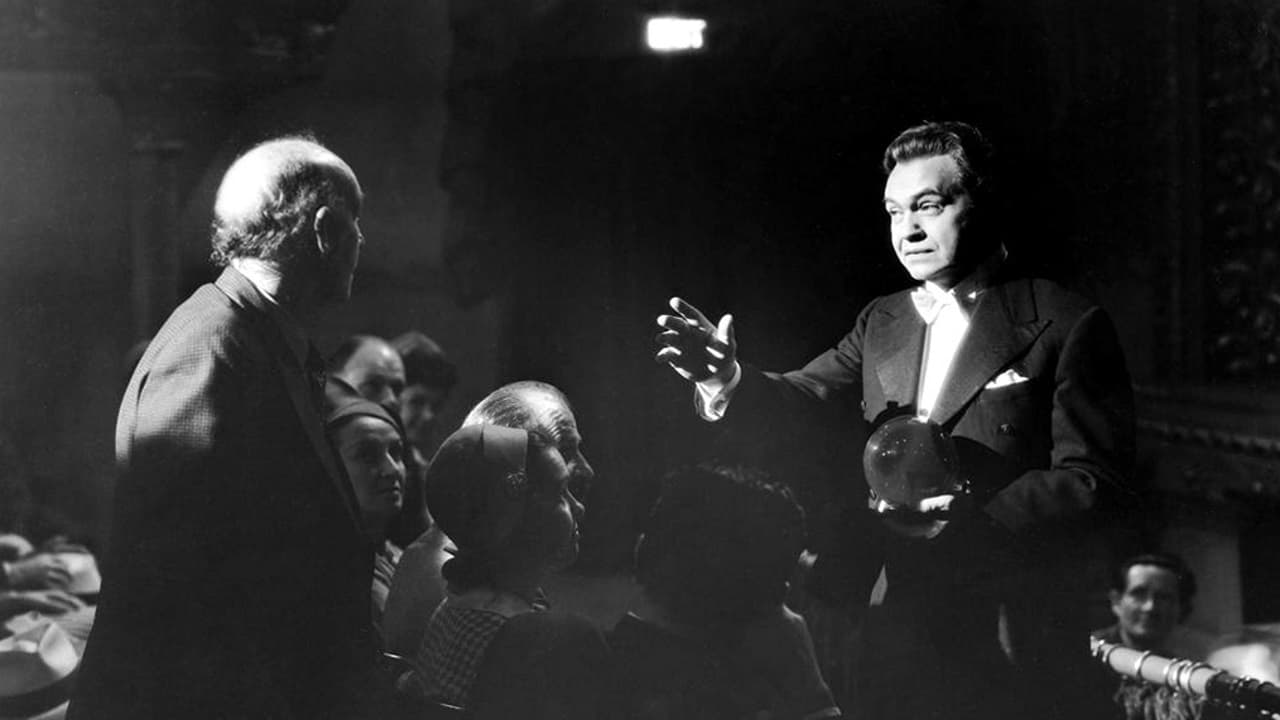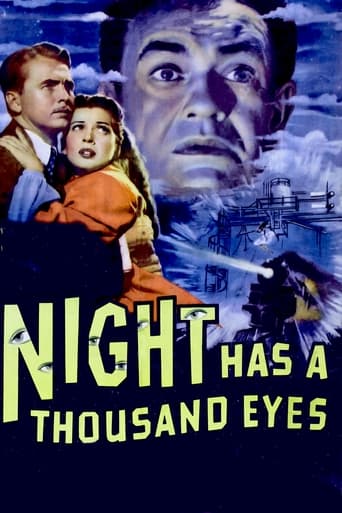



Nice effects though.
In truth, there is barely enough story here to make a film.
View MoreBlistering performances.
It's simply great fun, a winsome film and an occasionally over-the-top luxury fantasy that never flags.
View MoreEdward G. Robinson lends some dignity to "Night Has a Thousand Eyes," which concerns a fake psychic, who reads peoples' minds and answers their questions about love and happiness, but the psychic soon discovers he has strange premonitions about people dying. These premonitions come true. We open on Gail Russell, running at night paranoid of being watched and about to end her life, but John Lund saves her. The film's story is told by way of flashbacks in the beginning as to how Edward knew her father and how Edward affects her life. A mystery soon develops, as her father dies from a plane crash (which he predicted) but the plane had been sabotaged. Edward is trying to help Gail find the killer, but the police suspect him. The main criticism of the film is that it has a depressing and foreboding sense of doom which bogs the film down too much, making it feel rather heavy-handed. But director John Farrow gives it grade-A production values, and Robinson is always good in everything he does and he makes this more of must-see movie experience with him than it would be without him. By the end, you'll probably be impressed with him but a little depressed, considering the ending
View MoreTriton (Edward G Robinson) has the gift of 2nd sight. He withdraws from life as his ability to foresee the future can be disturbing, especially when he sees people die. This happens on a few occasions but when he meets with his ex-partner's daughter Jean (Gail Russell), we have a countdown to her imminent death before the week is over. The place she will die is "under the stars".This film has a good story and a good cast. Elliott (John Lund) is pretty annoying as a doubter but by the end of the film he has changed his tune. The film starts well with a suicide attempt and we are then taken back in time through flashback sequences to understand the characters before returning to the present as we wait for the death of Jean. There are some omens we are told to look out for - a trampled flower, a gust of wind, a broken vase, lion's feet, some spoken words - and sure enough, they all come true until we arrive at the moment of death - 11pm.William Demarest has some funny lines as "Lt Shawn", the policeman in charge of stopping the tragedy from happening and the story is cleverly tied up. I wasn't too convinced by Gail Russell's ability to negotiate business deals - she seems far too fragile a character to be involved in the hard-edged corporate world. But so what. It's a good film.
View MoreWilliam Irish aka George Hopley aka Cornell Woolrich (the latter appearing in the cast and credits,his real name) loved the subject so much that not only he wrote a short story but he also wrote a whole novel ,with the same characters .People complained that John Farrow sacrificed psychology to the plot.But it was not Woolrich's forte.His characters elude him,they are puppets ,not in his hands ,but in the hands of fate .This is his most revealing book:he did believe in the power of the stars (one of his short stories,one of his most desperate was called "no moon ,no stars"),he did believe that man's destiny is written before he lives and that he can't change it;the users who know about his miserable life remember that he spent his whole existence in a hotel room;he was gay but the only love he got was from his mother;he ended his life a disabled man ,diabetes leading to gangrene .John Farrow modified the book ,but he remained faithful to Woolrich's spirit;in the novel,it's the father of the girl who has got to die in a lion's jaws .Read it,even if you watched the movie,cause Woolrich's sense of tragedy has no equal in the Roman Noir.Only the ending is a bit embarrassing ,being somewhat contrived and adding a wrong track which weakened the intense emotion :too bad they did not keep the final lines between the girl and her friend.The opening scene on the railroad track can rival with the best films Noirs of the forties/early fifties,like those of Robert Siodmak (who took Woolrich's "phantom lady" to the screen) and Mitchell Leisen (whose "no man of her own" is a thousand times better than the pitiful FRench attempt called "J'Ai Epousé Une Ombre" ).Gail Russel,a relatively obscure actress has wonderful eyes which the director films in the scene in the car as bright as two stars in the night.The-man-who-can-predict-future was a secondary character in the book ,but Edward G.Robinson made it a winner;he added a guilt feeling ,which overwhelmed him and his performance was extraordinary all along the way;this part was tailor -made for him:remember Lang's "woman in the window" ,Duvivier' s "flesh and fantasy" or Siodmak's "the strange affair of Uncle Harry",all tormented characters who have perhaps done nothing and who are feeling guilt.A lot of bizarre details (the cushion,the gun which doesn't shoot,the flower under the shoe,the little boy on the street ,the strange music hall -a scene not unlike the contemporary adventure of Tintin:"Les Sept Boules DE Cristal") create a heavy atmosphere devoid of any providence.
View MoreI saw this on New York television as an impressionable thirteen year old in the early sixties. It's been on my top ten list of favorites ever since. Not only the expected intelligent, riveting performance from Robinson, but a touching, foreboding one from the luminous and tragic Gail Russell. This is my favorite Russell performance, followed by The Uninvited and Moonrise. What a waste that her life and talent was snuffed out at 36!
View More